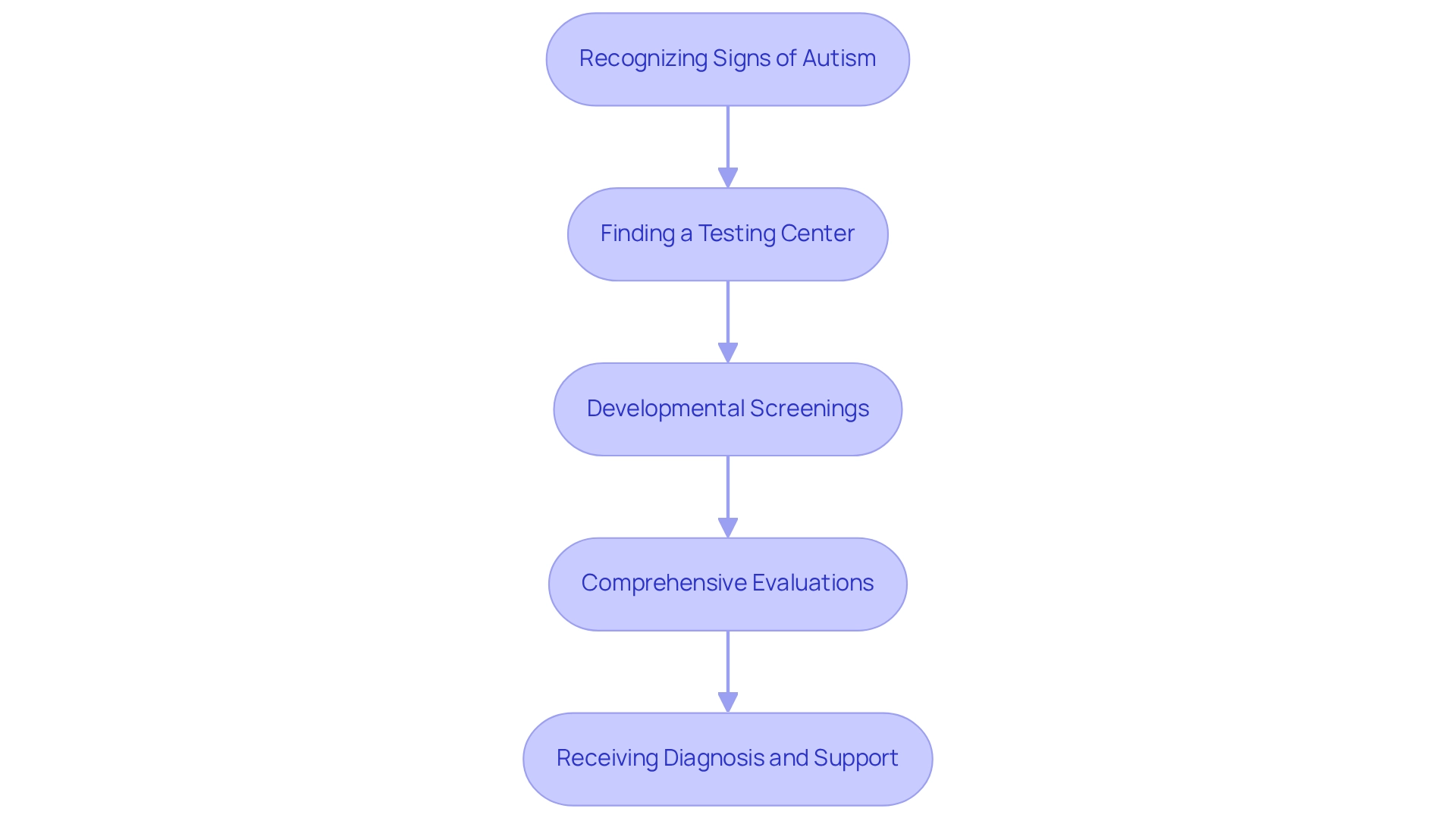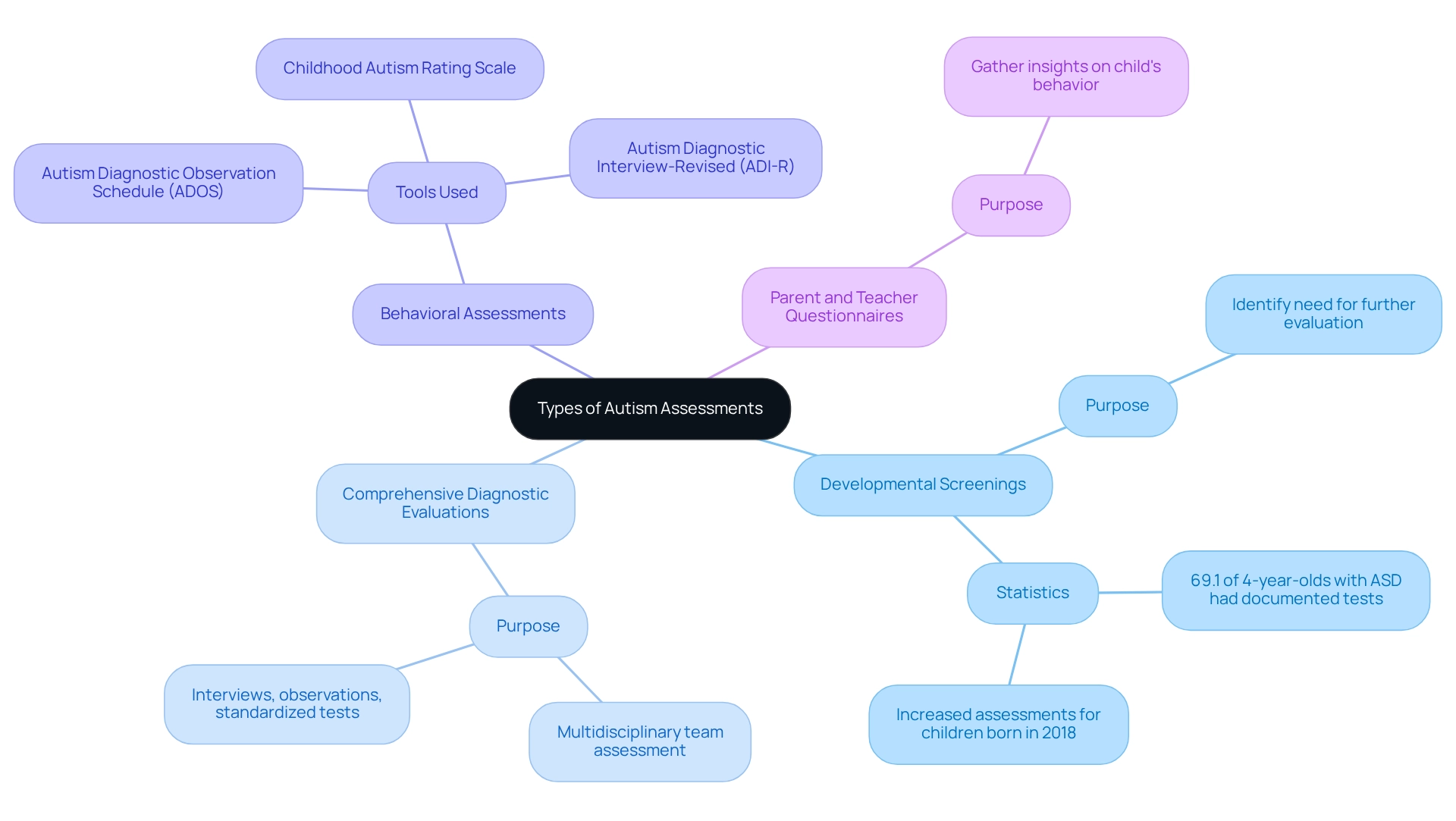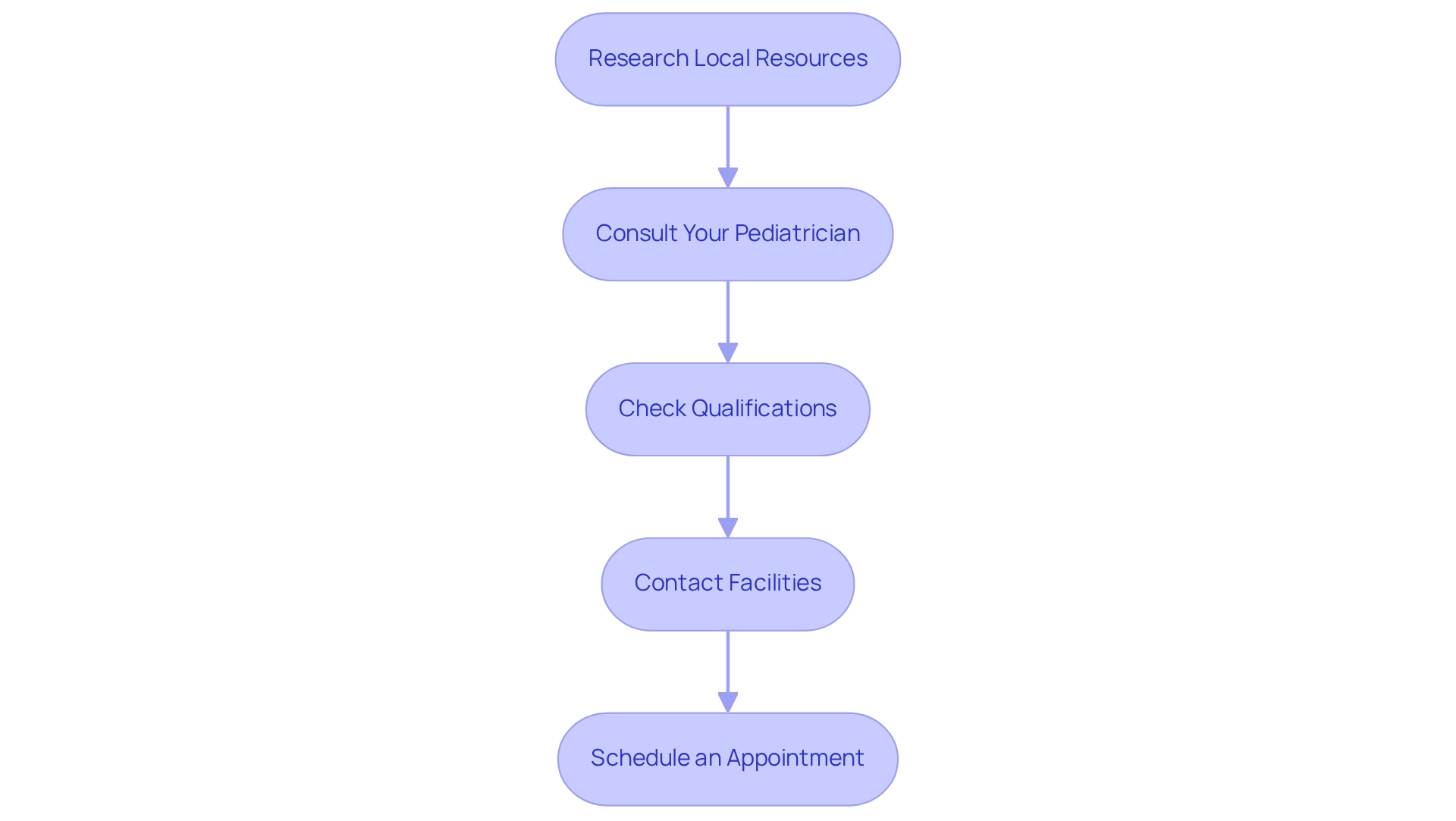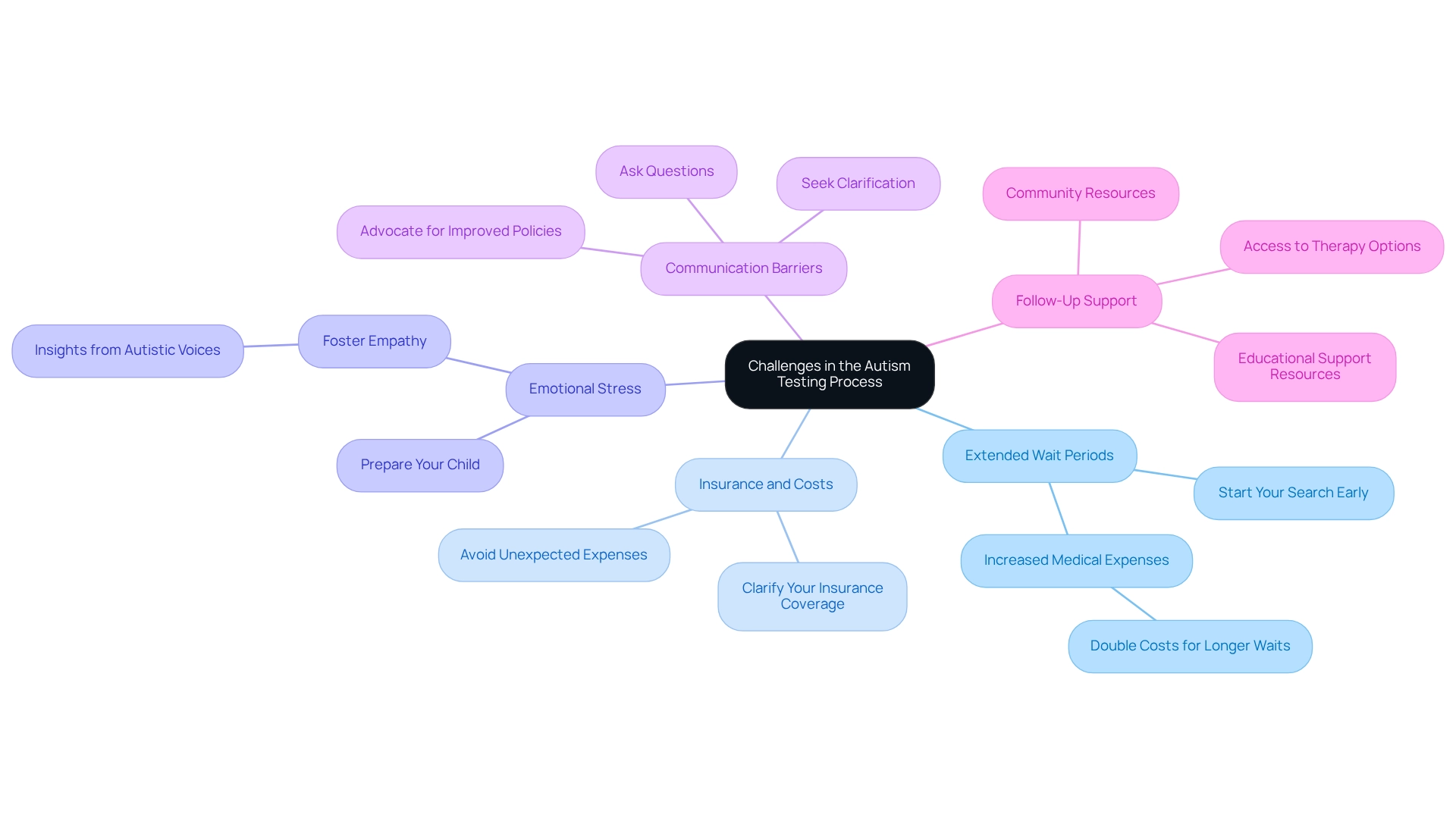Overview
For parents, the journey to understanding autism can be daunting, but there are local resources available to help. By consulting pediatricians and researching qualified facilities, parents can access the testing they need. Early diagnosis is crucial, and developmental screenings, along with comprehensive evaluations, can make a significant difference. Informed parents can navigate this process with confidence, ensuring timely support for their children. Remember, you are not alone in this journey; there are many resources and communities ready to support you.
Introduction
Navigating the world of autism testing is a vital journey for many families, as it lays the groundwork for understanding and supporting a child's unique needs. With autism spectrum disorder (ASD) impacting approximately 1 in 36 children, timely and accurate assessments become essential for unlocking the potential of those diagnosed. This article explores the importance of early diagnosis, the various types of assessments available, and practical steps for locating testing facilities. It also addresses the common challenges families may encounter during the testing process and offers strategies for overcoming them. By equipping themselves with knowledge and resources, parents can play a pivotal role in ensuring their child receives the support necessary for a brighter future.
Understand Autism Testing and Its Importance
Determining whether your child has autism spectrum disorder (ASD) is an important step, and many parents find themselves asking, where can I get tested for autism? Early diagnosis can significantly improve the effectiveness of interventions and support services. By recognizing the signs of autism—like challenges in communication, social interactions, and repetitive behaviors—you can empower yourself to take action swiftly for your child.
The testing process typically involves a combination of developmental screenings and comprehensive evaluations conducted by qualified professionals. This raises an important question: where can I get tested for autism? Understanding this process is essential, as research shows that early intervention can lead to significantly better outcomes for children with ASD. For instance, a study from the CDC's Autism and Developmental Disabilities Monitoring Network found that approximately 1 in every 36 children aged 8 years is diagnosed with ASD, with a notably higher prevalence in boys. In Arizona, the reported prevalence stands at 26.8 per 1,000 youth, underscoring the need for localized awareness.
As highlighted by Maenner MJ in "Prevalence and Characteristics of Autism Spectrum Disorder Among Children Aged 8 Years," early diagnosis is critical. Additionally, fathers of autistic children often express the importance of support in their children’s social development, shedding light on the challenges families face. By being informed about where to get tested for autism, you can ensure that your child receives the necessary support as early as possible, ultimately unlocking their potential and enhancing their quality of life.

Explore Different Types of Autism Assessments
A variety of autism assessments are utilized by professionals to evaluate children for autism, each serving a distinct purpose that can greatly impact your child's future:
-
Developmental Screenings: Conducted during regular pediatric check-ups, these brief assessments help identify individuals who may need further evaluation. Recent statistics reveal that among individuals aged 4 years with ASD, 69.1% had an ASD test documented in their records. This highlights the importance of early identification. Moreover, there has been a recognized trend of increased assessments and ASD identification among youngsters born in 2018. As a result, many parents are asking, "Where can I get tested for autism?" This process began to resume by June 2020.
-
Comprehensive Diagnostic Evaluations: This thorough assessment involves a multidisciplinary team, including psychologists, speech therapists, and occupational therapists. It encompasses interviews, observations, and standardized tests to provide a complete picture of your child's development.
-
Behavioral Assessments: Tools such as the Autism Diagnostic Observation Schedule (ADOS) and the Autism Diagnostic Interview-Revised (ADI-R) focus on observing the individual's behavior across various contexts, evaluating social communication and interaction abilities. The Childhood Autism Rating Scale is also frequently used among youngsters aged 4 years with ASD.
-
Parent and Teacher Questionnaires: These questionnaires gather insights from parents and educators regarding the child's behavior in different environments, offering professionals a comprehensive perspective on the child's development.
Social workers play an essential role in helping parents prepare for their child's future, simplifying the planning into manageable steps. By understanding these evaluations, parents can better prepare for the review process and know where to seek autism testing, ensuring they ask informed questions and advocate effectively for their child's needs.
A case study titled 'Benefits of ABA Therapy' showcases the quantifiable enhancements in everyday life that ABA therapy can offer, demonstrating the significance of efficient evaluations in identifying suitable treatment options. As Zachary Warren pointed out, receiving training as a consultant for OCALI underscores the importance of professional insights in managing these evaluations.
If you have experiences or questions, we encourage you to share them in the comments or through our newsletters. Your journey matters, and support is available.

Locate Testing Facilities: A Step-by-Step Process
Finding the right testing facilities for autism assessments can feel overwhelming, but you’re not alone in this journey. Here’s a compassionate guide to help you navigate the process:
- Research Local Resources: Begin your search by exploring online directories for evaluation centers near you. Organizations like Autism Speaks and the Autism Society provide invaluable resources to find where you can get tested for autism service providers.
- Consult Your Pediatrician: Your child’s physician can be a trusted ally, offering recommendations for experts or facilities known for their thorough evaluations.
- Check Qualifications: It’s essential to ensure that the facility employs qualified professionals, such as developmental pediatricians, youth psychologists, or licensed therapists experienced in autism evaluations.
- Contact Facilities: Reach out to the centers you’ve identified to learn more about their assessment processes. Inquire about average wait times—these can vary significantly by region—and any documentation you may need to prepare.
- Schedule an Appointment: Once you find a facility that feels right, schedule an appointment for an initial consultation or screening. Be prepared to discuss your child’s developmental history and any specific concerns you might have.
In 2022, there was a notable increase in evaluations and identification of developmental disorders, particularly among diverse populations, including A/PI, Black, Hispanic, and multiracial children, compared to their White peers. This underscores the importance of timely assessments. Additionally, attending seminars on developmental disorders can provide valuable insights for parents and caregivers, including guidance on where to get tested for autism. As highlighted by Patrick ME, "Prevalence and Early Identification of Autism Spectrum Disorder Among Children Aged 4 and 8 Years — Autism and Developmental Disabilities Monitoring Network, 16 Sites, United States, 2022," early identification is vital. Furthermore, the ADDM Network’s ongoing efforts to monitor ASD prevalence and enhance service planning emphasize the importance of data in understanding ASD characteristics and needs. By following these steps, you can confidently navigate the path to finding the right testing facility for your child.

Navigate Challenges in the Testing Process
The challenges in the autism testing process can leave many parents wondering, where can I get tested for autism? Understanding these obstacles can help you navigate this journey more effectively.
-
Extended Wait Periods: Many facilities experience significant wait times for evaluations, which can be incredibly frustrating. To tackle this, start your search early and explore various facilities where you can get tested for autism. This proactive approach may increase your chances of securing an appointment sooner. Research indicates that children facing longer wait times often incur all-cause medical expenses that are approximately double those of peers diagnosed more quickly.
-
Insurance and Costs: Familiarize yourself with your insurance policy regarding autism evaluations. Reach out to your provider to clarify what services are covered and what potential out-of-pocket costs you might face. Having this knowledge can help you avoid unexpected expenses and guide you toward facilities where you can get tested for autism, ensuring you receive the necessary support.
-
Emotional Stress: The evaluation process can be emotionally taxing for both parents and children. Prepare your child by explaining the steps in simple terms and reassuring them of your support throughout the process. This preparation can ease anxiety and lead to a more positive experience. Insights from the case study 'Sharing the Unique Perspectives of Autistic Voices' highlight the importance of recognizing emotional stress and fostering empathy during this time.
-
Communication Barriers: If you find it challenging to communicate with professionals, don’t hesitate to ask questions or seek clarification. Effective communication is vital to understanding the evaluation process and its outcomes, especially when considering where can I get tested for autism. As one specialist noted, "Advocates would do well to support policies that encourage providers to get out of their own way," emphasizing the need for improved communication and accessibility in the testing process.
-
Follow-Up Support: After the assessment, having access to follow-up support and resources is essential. This may include therapy options, educational support, or community resources that can aid your child's development. The success of coordinated pathways indicates a pressing need for further development in autism services, enhancing the support available to families.
By being proactive and informed, parents can navigate these challenges effectively and advocate for their child's needs throughout the testing process. Share your experiences in the comments or through our newsletter; your voice matters in this journey.

Conclusion
Understanding the process of autism testing is essential for families seeking to support their child's unique needs. Early diagnosis is critical, as it significantly enhances the effectiveness of interventions and support services. By recognizing the signs of autism and utilizing a variety of assessments—from developmental screenings to comprehensive evaluations—parents can ensure that their children receive the timely support they require. This proactive approach not only unlocks the potential of children diagnosed with autism spectrum disorder (ASD) but also improves their overall quality of life.
Locating appropriate testing facilities is a vital step in this journey. By researching local resources, consulting pediatricians, and verifying the qualifications of professionals, parents can navigate the often-complex landscape of autism assessments. It is important to be prepared for potential challenges, such as long wait times and emotional stress, while remaining informed about insurance coverage and costs. Clear communication with healthcare providers is crucial in overcoming these obstacles and ensuring a smoother testing process.
Ultimately, the commitment to early identification and intervention can make a profound difference in the lives of children with ASD and their families. By equipping themselves with knowledge and resources, parents can advocate effectively for their children's needs, paving the way for a brighter future. The journey may be challenging, but with the right support and information, families can navigate the autism testing process with confidence and hope.
Frequently Asked Questions
Why is it important to determine if my child has autism spectrum disorder (ASD)?
Determining if your child has ASD is crucial because early diagnosis can significantly improve the effectiveness of interventions and support services.
What are some signs of autism that parents should look for?
Signs of autism include challenges in communication, difficulties in social interactions, and repetitive behaviors.
What does the testing process for autism typically involve?
The testing process usually includes a combination of developmental screenings and comprehensive evaluations conducted by qualified professionals.
Where can I get my child tested for autism?
You can get your child tested for autism through qualified professionals who conduct developmental screenings and evaluations, although specific locations may vary based on your area.
How prevalent is autism spectrum disorder among children?
Research shows that approximately 1 in every 36 children aged 8 years is diagnosed with ASD, with a notably higher prevalence in boys.
What is the reported prevalence of autism in Arizona?
In Arizona, the reported prevalence of autism stands at 26.8 per 1,000 youth.
Why is early diagnosis critical for children with ASD?
Early diagnosis is critical because it allows for timely intervention, which can lead to significantly better outcomes for children with ASD.
What challenges do families face when raising autistic children?
Families often face challenges related to their children's social development, highlighting the importance of support for both children and their families.




